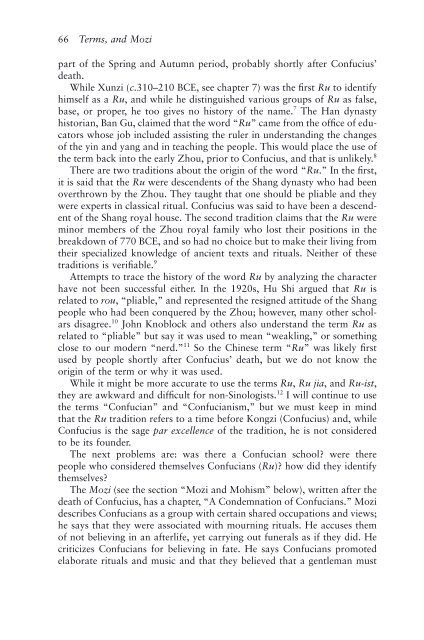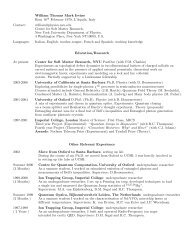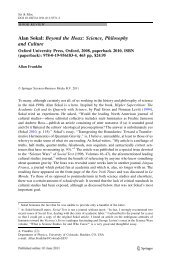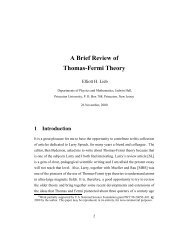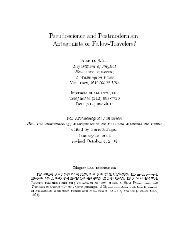Good Confucianism book (pdf) - Department of Physics
Good Confucianism book (pdf) - Department of Physics
Good Confucianism book (pdf) - Department of Physics
Create successful ePaper yourself
Turn your PDF publications into a flip-book with our unique Google optimized e-Paper software.
66 Terms, and Mozipart <strong>of</strong> the Spring and Autumn period, probably shortly after Confucius ’death.While Xunzi ( c .310 – 210 BCE, see chapter 7 ) was the first Ru to identifyhimself as a Ru , and while he distinguished various groups <strong>of</strong> Ru as false,base, or proper, he too gives no history <strong>of</strong> the name. 7 The Han dynastyhistorian, Ban Gu, claimed that the word “ Ru ” came from the <strong>of</strong>fice <strong>of</strong> educatorswhose job included assisting the ruler in understanding the changes<strong>of</strong> the yin and yang and in teaching the people. This would place the use <strong>of</strong>the term back into the early Zhou, prior to Confucius, and that is unlikely. 8There are two traditions about the origin <strong>of</strong> the word “ Ru . ” In the first,it is said that the Ru were descendents <strong>of</strong> the Shang dynasty who had beenoverthrown by the Zhou. They taught that one should be pliable and theywere experts in classical ritual. Confucius was said to have been a descendent<strong>of</strong> the Shang royal house. The second tradition claims that the Ru wereminor members <strong>of</strong> the Zhou royal family who lost their positions in thebreakdown <strong>of</strong> 770 BCE, and so had no choice but to make their living fromtheir specialized knowledge <strong>of</strong> ancient texts and rituals. Neither <strong>of</strong> thesetraditions is verifiable. 9Attempts to trace the history <strong>of</strong> the word Ru by analyzing the characterhave not been successful either. In the 1920s, Hu Shi argued that Ru isrelated to rou , “ pliable, ” and represented the resigned attitude <strong>of</strong> the Shangpeople who had been conquered by the Zhou; however, many other scholarsdisagree. 10 John Knoblock and others also understand the term Ru asrelated to “ pliable ” but say it was used to mean “ weakling, ” or somethingclose to our modern “ nerd. ” 11 So the Chinese term “ Ru ” was likely firstused by people shortly after Confucius ’ death, but we do not know theorigin <strong>of</strong> the term or why it was used.While it might be more accurate to use the terms Ru , Ru jia , and Ru - ist ,they are awkward and difficult for non - Sinologists. 12 I will continue to usethe terms “ Confucian ” and “ <strong>Confucianism</strong>, ” but we must keep in mindthat the Ru tradition refers to a time before Kongzi (Confucius) and, whileConfucius is the sage par excellence <strong>of</strong> the tradition, he is not consideredto be its founder.The next problems are: was there a Confucian school? were therepeople who considered themselves Confucians ( Ru )? how did they identifythemselves?The Mozi (see the section “ Mozi and Mohism ” below), written after thedeath <strong>of</strong> Confucius, has a chapter, “ A Condemnation <strong>of</strong> Confucians. ” Mozidescribes Confucians as a group with certain shared occupations and views;he says that they were associated with mourning rituals. He accuses them<strong>of</strong> not believing in an afterlife, yet carrying out funerals as if they did. Hecriticizes Confucians for believing in fate. He says Confucians promotedelaborate rituals and music and that they believed that a gentleman must


